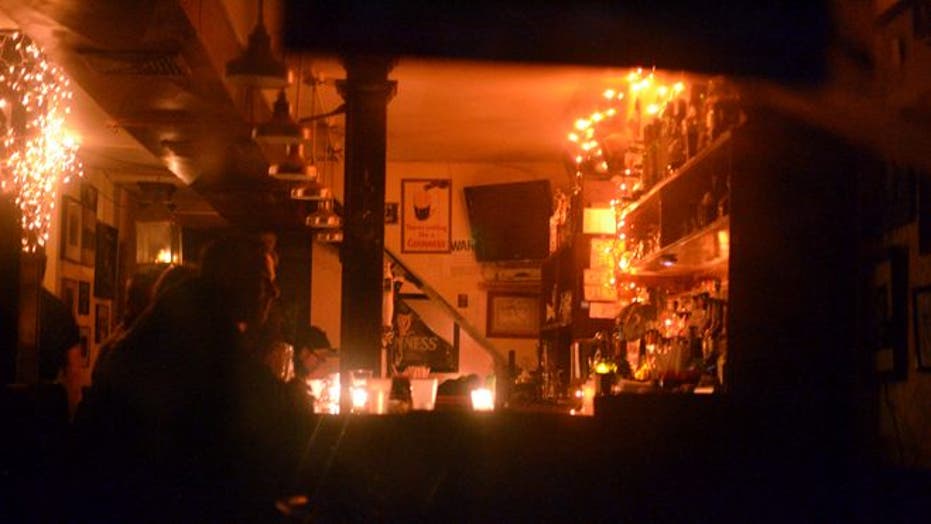New York – On any normal late night in Lower Manhattan's Loisaida neighborhood, the streets are crowded with people heading to bars, hanging outside their buildings or making runs to the nearest bodega. However, less than 24 hours after Hurricane Sandy rolled through the city, the Puerto Rican stronghold was anything but normal.
Besides a few candlelit bars and a generator-fueled NYPD service area on Avenue C, the neighborhood lay in almost total darkness. Downed trees and the random wrecked car dotted almost deserted streets, giving the normally bustling neighborhood a post-apocalyptic air.
“It’s crazy out here,” said Greg Sanchez, who lives on the 11th floor of a high-rise apartment building on Avenue D in Loisaida. “It’s been tough without power, especially keeping food from going bad.”
Everyone is lending each other a hand, trying to make the most out of a bad situation. There’s been no problem around here.
Monday's monster storm flooded much of Lower Manhattan, devastating stores and homes and shutting down the city's massive transit system. It also left some 250,000 people in Lower Manhattan in the dark after a Consolidated Edison substation on on East 14th Street was inundated with salt water from a 14-foot storm surge.
For those people living in the area, keeping food – and more importantly finding food and water – seemed to be their top priorities.
With little hope that power would return anytime soon, Loisaida residents began journeying to other parts of Manhattan in search of food, water and, most importantly to some, a place to charge their cellphones.
“I figured I’d leave the neighborhood and go somewhere else but everyone else had the same idea,” said Herbert Lofton, an electrician who lives on Avenue D.
Lofton, who took an MTA bus uptown after sporadic service resumed at 5 p.m. Tuesday, said that most of the stores where power remained on in Manhattan were out of water, batteries and other necessities. He eventually made his way to an AMC movie theater in Midtown Manhattan where he could charge his phone.
“I guess we were a little too late, but at least we tried,” said Gina Williams, who accompanied Lofton on his search.
Despite the loss of power through Lower Manhattan, some business owners refused to close up shop. There were bars in the area that left their taps open under candlelight and a few of New York’s infamous bodegas kept vigil under the glow of candles and flashlights to serve the area’s hungry and thirsty.
On the northeast corner of the East Village’s Tompkins Square Park, Sheen Brother’s Deli was a refuge for residents seeking a late night snack or some warm bottles of water. The fluorescent glow of a flashlight drew people in looking for crackers, chips and New York City’s pricey cigarettes.
“We’re keeping the place open to help out people, and because it’s good business,” said Ismael Luna, a worker at the bodega, adding that the biggest seller since the power went out had been beer.
Sheen Brothers was one of a number of delis and bodega’s operating in the glow of candlelight throughout Manhattan’s East Village.
Since the aftermath of Hurricane Katrina in 2005, where reports of widespread looting and violence shook the nation, there have been concerns that similar problems could arise in other cities following a natural disaster. Earlier in the day, local radio reported that some New York City residents feared looting in the city, given the lack of power and high-population density.
Lower Manhattan on the night after Sandy, however, remained more-or-less calm and quiet.
“There’s been no problems out here,” said one NYPD officer who asked not to be named. “It’s been really quiet and everyone’s been really helpful.”
While the streets during the daytime on Tuesday looked like any other busy day in Manhattan, it was desolate at night, Williams said.
“It’s like a curfew,” she added. “As soon as it gets dark everyone goes upstairs because nobody wants to be out here.”
As residents wait for power to return and for the city to get back to normal, people seem to be pulling together to help each other and get things done. Most residents expressed concern for the elderly neighbors and young children. And they wanted the electricity -- and their heat and water -- to return.
“Everyone is lending each other a hand, trying to make the most out of a bad situation,” Sanchez said. “There’s been no problem around here.”
Follow us on twitter.com/foxnewslatino
Like us at facebook.com/foxnewslatino

